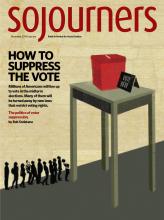THE CRY OF the church to the world should be “Forgive us.”
At a time when the American church struggles with finding its place in the world and struggles with asserting its identity, could the church be known as the community that models confession, repentance, and the seeking of forgiveness? At this moment in history, the American church is often ridiculed or portrayed as unforgiving and ungracious. Could the church offer a counter-narrative, not of defensiveness or derision but of an authentic confession and genuine reconciliation? By examining seven different areas where the church has committed sin, we ask the church to consider the spiritual power and the theological integrity of a church that seeks forgiveness for those sins.
Our scriptures testify to the necessity of confession. Confession is central to the Christian faith. The importance of confession arises from the Christian view of sin. Sin is a reality and must be taken seriously. Evangelicals consistently begin our gospel presentation with the centrality of sin to the human experience. American evangelicals often assert that the beginning of the work of God’s forgiveness is the recognition of our need for God because of human sinfulness.
It is antithetical to the gospel when we do not confess all forms of sin—both individual and corporate. The reason evangelicals can claim to be followers of Jesus is because there has been an acknowledgement of sin and the seeking of God’s grace through Jesus Christ that leads to the forgiveness of sin.
Read the Full Article
